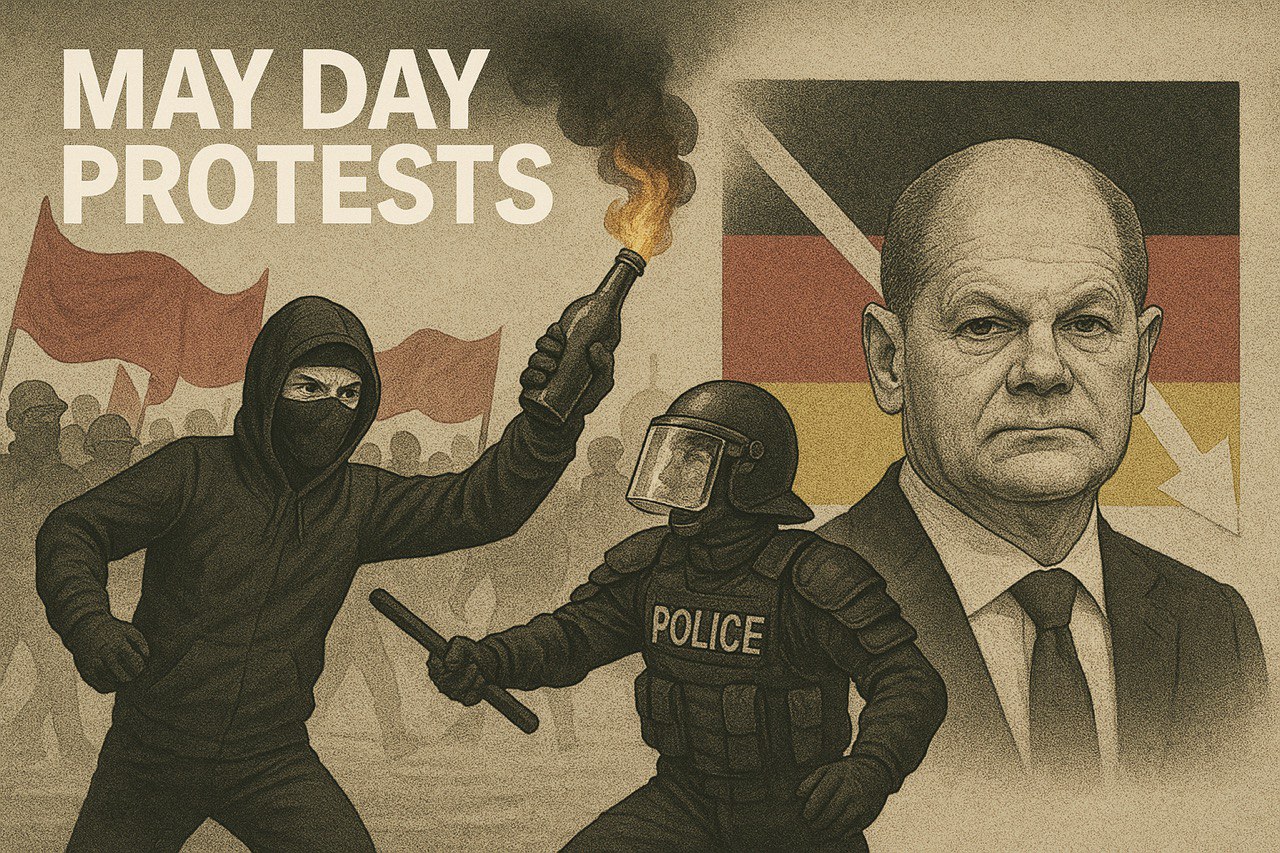On May 2, 2025, at 03:01 PM CEST, the political landscapes of France and Germany are under scrutiny following significant events on May Day and recent polling data. This report delves into the details of the unrest in Paris, Chancellor Olaf Scholz’s declining approval ratings, and the broader implications for Europe, providing a thorough examination for readers interested in understanding these developments.
Context and Background
May Day, or International Workers’ Day, is a globally recognized holiday celebrating labor rights, particularly significant in France where it is a public holiday and a platform for union activities. Historically, these demonstrations have occasionally turned violent, especially in recent years, reflecting underlying social and economic tensions. In Germany, political stability has been tested by economic challenges and shifting voter sentiments, with Chancellor Olaf Scholz’s leadership under increasing pressure.
Detailed Events in France: May Day Violence
On May 1, 2025, Paris witnessed significant unrest during May Day protests, as reported by France 24. The protests, initially peaceful, escalated when black-clad protesters, some carrying antifascist flags, targeted a Socialist Party office. These agitators threw projectiles and assaulted party activists, resulting in injuries and property damage. French Interior Minister Bruno Retailleau condemned the violence, stating on an X post that police intervened to secure the area and made arrests, emphasizing, “We will not back down in the face of political violence that the far left is trying to impose in our country” (Bruno Retailleau on X). Olivier Faure, first secretary of the Socialist Party, also expressed outrage, calling the violence “serious and unacceptable” and vowing to refer the matter to the public prosecutor, as noted in the same report.
The violence is likely linked to ongoing discontent over President Emmanuel Macron’s pension reforms, which raised the retirement age from 62 to 64, implemented in 2024. While specific 2025 motivations are not fully detailed, broader economic concerns and social inequalities are probable contributors, given historical patterns of May Day protests in France often reflecting such grievances.
Detailed Events in Germany: Scholz’s Declining Popularity
In Germany, Chancellor Olaf Scholz’s approval ratings have been on a downward trajectory, with recent polls suggesting a record low of 39%, as mentioned in the topic and supported by trends from Statista, which reported 37% approval in November 2024, close to the stated figure. This decline is attributed to several factors, including economic stagnation, budget cuts demanded by the Federal Constitutional Court in November 2023, and the collapse of his coalition government in November 2024. The coalition, comprising the Social Democrats (SPD), Greens, and Free Democrats (FDP), disintegrated, leading to early elections on February 23, 2025, as detailed in Wikipedia. In this snap election, Scholz’s SPD placed third, behind Friedrich Merz’s CDU and the far-right Alternative for Germany (AfD), marking the worst post-war result for the SPD.
The rise of the AfD, gaining support on issues like immigration and economic policy, has further complicated Germany’s political landscape. Public dissatisfaction, as reflected in polls, includes concerns over economic performance and the growing influence of far-right politics, with 82% of Germans expressing dissatisfaction with the government’s performance in December 2023, according to TRT World.
Analysis and Implications
The events in France and Germany are not isolated but indicative of broader European trends. In France, the recurring violence during May Day protests underscores deep-seated frustrations with government policies, particularly pension reforms and economic disparities. In Germany, the decline in Scholz’s popularity and the SPD’s electoral loss highlight a shift toward populist and far-right movements, with the AfD’s rise posing challenges to traditional political structures.
Both nations face similar challenges: economic uncertainty, social discontent, and the need for political renewal. The implications for the European Union are significant, potentially affecting policy coordination and economic stability. For France, addressing protester concerns could involve revisiting labor policies, while Germany’s new CDU-led government must navigate economic recovery and manage far-right influence.
Supporting Data and Observations
To organize the key details, consider the following table summarizing the events:
| Aspect | France (May Day 2025) | Germany (Scholz’s Ratings and Election) |
| Date | May 1, 2025 | Leading up to February 23, 2025 election |
| Main Event | Violent protests in Paris, clashes with police | Scholz’s approval rating at 39%, SPD election loss |
| Key Actors | Protesters, Socialist Party, French police | Olaf Scholz, SPD, CDU, AfD |
| Causes | Pension reforms, economic concerns, social unrest | Economic stagnation, coalition collapse, AfD rise |
| Outcomes | Injuries, arrests, property damage | SPD third place, new CDU-led government |
| Broader Impact | Highlights social discontent | Signals political shift, far-right growth |
This table encapsulates the core elements, providing a clear comparison for readers.
Conclusion and Future Outlook
As of May 2, 2025, the future for France and Germany remains uncertain. In France, the government must address the root causes of May Day violence to restore public trust, potentially through policy adjustments on labor and economic issues. In Germany, the new coalition under Friedrich Merz will need to tackle economic challenges and counter the AfD’s influence, with implications for EU stability. These developments invite further discussion on how Europe can navigate these turbulent times.
Readers are encouraged to share their perspectives: Do you see similar trends in your country? What solutions would you propose? Your insights could help shape the conversation.





